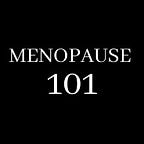How Do I Know If I’m in Perimenopause?
Perimenopause, which literally means “around menopause” (and is also known as the “menopause transition”) refers to the time in a woman’s life when your body begins to slow down the production of estrogen, making its way into menopause and the end of fertility. When naturally occurring — and not medically induced — perimenopause most often begins in one’s mid-40s, but it can start upwards of a decade earlier. If medically induced through hormone therapy or many cancer treatments, perimenopause can begin at any age after a person who is gender assigned female at birth goes through puberty. During perimenopause estrogen levels rise and fall unevenly and we make our way to our new lower hormonal balance. This variable/erratic pattern is what’s responsible for the variable/erratic experience we may have with symptoms.
What are the first signs of perimenopause?
Every woman’s body and experience of perimenopause is different, though the most common first symptoms of perimenopause include changes to your period (almost all women) — either a consistent change in the length of your cycles or large gaps between periods (60 days or more) — this change can be variable and affect time between cycles, length of cycle and pattern of bleeding. During perimenopause, many (but not all) women will commonly experience sleep disruptions, mood swings, and hot flashes. While these symptoms indicate that the menopause transition has begun, it’s likely you’ll still have years before your last menstrual cycle. Most common symptom aside from period change is hot flashes (80 percent of women experience them).
Is there a test for perimenopause?
The answer here is tricky! Hormone levels change frequently during perimenopause, which can make accurate hormone testing difficult, or at least not terribly useful. Your doctor may find hormone testing helpful not so much for gauging whether or not you’ve entered perimenopause, but for issues such as ruling out thyroid disease, understanding your fertility, or to learn more about what’s happening in your body if you stop menstruating at a young age.
Should I ask for hormone testing to indicate perimenopause?
Keep in mind that every patient’s story is different and the best first step is to talk to your physician. One reason your doctor may want to perform a follicle-stimulating hormone (FSH) level test is to confirm you’ve entered fully into menopause. If you haven’t had your period in over a year and your FSH level is 30 mIU/mL or higher, your healthcare provider will most likely make the assessment that you have reached full menopause.
But that doesn’t mean an FSH works to diagnose perimenopause. Because a woman’s hormone levels seesaw during this time, the result can vary from month to month and even week to week, making a hormone test for perimenopause difficult to read if not downright inconclusive. Still, you should always consult your provider when deciding about any tests, including those that measure FSH levels.
In fact, if you’re not already, perimenopause is the perfect time of your life to get regular physical exams, measure all of your systems, and make sure your body is in good health.
Know that checking hormone levels is generally not standard practice for most women during perimenopause because levels vary widely and are not generally needed to confirm what’s going on. We generally don’t check estrogen and FSH levels to confirm menopause: no cycle 12 months at expected age of menopause = MENOPAUSE.
Tracking your cycle and symptoms is a better way to assess what’s happening in your body. Exceptions: Women younger than 40 to identify premature menopause, women who do not have their period (uterus removed or an IUD in place), or women who take hormones that regulate their cycle. Age of relatives’ menopause may be helpful, especially sisters who grew up in the same environment as you. In our practice we stress the benefit of tracking your cycle and any symptoms during this time — this is usually the best way for women to understand their body and communicate to their provider what’s happening.
The information provided on StateOfMenopause.com is not intended and should not be construed as medical advice, treatment, or diagnosis. Always seek the guidance of a qualified healthcare provider with any questions or concerns regarding your health.
